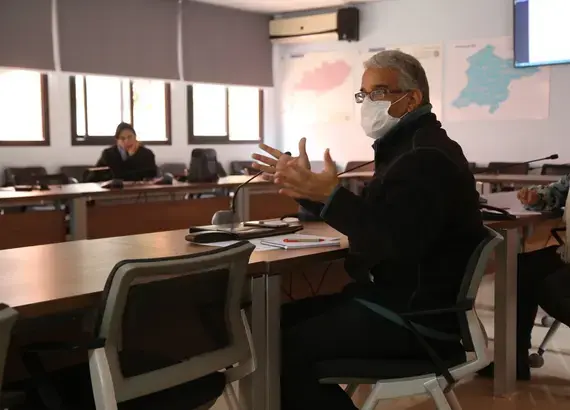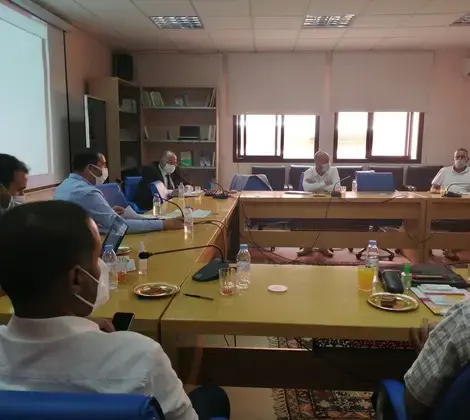
Success Story
Citizens Advisory Groups Make Inroads with Regional Policy-Makers in Morocco
In 2015, Morocco began an initiative to shift governing power from a national, more centralized model, to a regional model, in part to strengthen citizen trust and participation in government processes. Without adequate outreach, communication, and citizen consultation, though, regional government has, at times, been just as inaccessible as national politics. To fill this gap, Morocco’s regionalization initiative established citizen advisory groups called consultative bodies (CBs) in each region to provide citizen recommendations for policy. But lacking support and training, many of these CBs initially struggled to get off the ground.
Since 2019, NDI has been working to build the skills of these CBs in addition to regional policy makers in the regions of Casablanca-Settat, Marrakech-Safi, Oriental, and Souss-Massa.

For many citizens within the CBs, these meetings were the first time that they had the opportunity to discuss their recommendations for regional policies and priorities with regional council members. Themes of equity ran through many of the citizen recommendations. In Oriental and Marrakech-Safi, citizens suggested that their councils’ policies for economic growth be responsive to the needs of young Moroccans, as young Moroccans are unemployed at higher rates across the country.
Other policies centered on the tourism promotion of cultural sites in Marrakech-Safi where citizens suggested weaving local businesses into these promotions to further support the local economy. In Casablanca-Settat, citizens encouraged regional officials to consider gender parity in economic policy.
These four joint sessions have opened up communication between citizens and subnational government officials in an unprecedented way. Regional council members have respectfully received citizen feedback and celebrated their participation; “I congratulate the consultative body members for their hard work and high-level discussions. Your suggestions have been judicious, and need to be taken into consideration by the regional council,” said one regional council member from Souss-Massa. In Casablanca-Settat, the consultative body’s recommendation that gender representation be incorporated into the council’s draft policy was immediately accepted and put into place. In other regions, while no immediate action has yet been taken to implement citizens’ recommendations, officials promised close considerations in their upcoming meetings.
Citizens encouraged the regional councils to continue to open these channels of communication regularly to improve governance. “One of the strongest recommendations I have for the regional council is to improve communication, without which we have a gap of understanding. Communication allows exchanges between the citizens, and political and economic partners, which facilitates the engagement of citizens in the local development process,” said one participant.
To support the CBs ahead of their meetings with the RCs and in their work more broadly, NDI has provided training on skills related to policy debates; understanding the laws governing the regionalization process in Morocco; the procedure for filing petitions with the regional government; and how to formulate policy recommendations, among others. Despite the challenge of COVID-19, which limited movement and ability to meet in person for much of 2020, CBs continued to take part in virtual workshops with NDI and remained committed to the project of regional government. NDI continues to support citizen engagement in Casablanca-Settat, Marrakech-Safi, Oriental, and Souss-Massa through these citizen consultative bodies in addition to representatives from civil society organizations
I’m very grateful for the tools and skills I have acquired during these training sessions... We are always working for a better environment and a brighter future and these tools are essential in order to communicate the problems of the citizens to the Regional Council.
Youth consultative body representative, Marrakech-Safi
It is clear that NDI’s partners have been putting their skills to good use. Successful sessions like those held in fall 2020 and winter 2021 signal progress toward and commitment to establishing the kind of close communication between politicians and citizens at the regional level that makes subnational government effective.
Moving into the spring, as Morocco’s regional governments reconvene for their next regularly scheduled meetings, citizens are looking to capitalize on their momentum. One representative from Marrakech-Safi’s consultative bodies has set her sights on the regional planning process: “Now, we must succeed in developing a [written] opinion on the implementation of the regional development plan,” she said. And others are following suit, setting goals to influence future policy discussions, and continuing to center citizen participation in regional decision making.
NDI’s engagement with the regionalization process in Morocco is implemented with support from the German Agency for International Cooperation (GIZ) commissioned by the Government of the Federal Republic of Germany.
NDI is a non-profit, non-partisan, non-governmental organization that works in partnership around the world to strengthen and safeguard democratic institutions, processes, norms and values to secure a better quality of life for all. NDI envisions a world where democracy and freedom prevail, with dignity for all.



